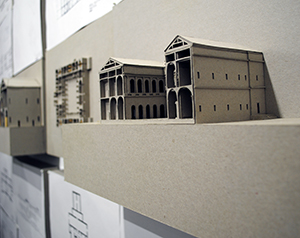Latest News Archive
Please select Category, Year, and then Month to display items
12 January 2024
|
Story Nonsindiswe Qwabe
|
Photo Sonia Small
 Since joining the UFS in 2008, Dr Grey Magaiza has worked extensively on approaches that can foster the socio-economic transformation of societies.
Since joining the UFS in 2008, Dr Grey Magaiza has worked extensively on approaches that can foster the socio-economic transformation of societies.
“The future should be one where communities can decide on their development agenda and futures. That’s the most important for me.” Dr Grey Magaiza, Deputy Director of the Centre for Gender and Africa Studies (CGAS) and Head of the Community Development programme on the Qwaqwa Campus, is passionate about capacitating communities to be agents of change and advancement. His vision for the future emphasises the empowerment of communities to take charge of their development by actively participating in decision making and the implementation of development projects that can improve their lives.
Since joining the UFS in 2008, Dr Magaiza has worked extensively on approaches that can foster the socio-economic transformation of societies. Over the years, he has crafted his research speciality into one that he is most proud of – being an interdisciplinary scientist immersed in the development of communities.
“I’m in a fortunate position of researching what I like. I say ‘fortunate’, because I’ve taken the time to understand what I’m passionate about, which is the overall field of rural livelihoods and livelihood futures – in short, community development. My research starts from an engaged university, understanding the elements that a university must use to enhance transformation and relevance to its immediate community in terms of development.”
One of the ways he has done this is by looking at social entrepreneurship as a development approach for young people in a rural setting. Through workshops with non-profit and civic organisations in Qwaqwa, Dr Magaiza has been helping these organisations to map out their needs and actively meet them through the involvement and support of external role players.
“We understand that communities are part of the national development agenda, but even that national agenda respects community knowledge and intentions and allows communities to shape their identity. A critical enabler of this is community organising. You bring back the capacity in communities to have dialogues on issues affecting them as spaces for engagement, knowledge exchange, and for people to just talk about their way forward.”
By enabling communities to define their development agenda, they can address their specific needs, challenges, and aspirations, he said. “When I look at livelihood futures, it’s quite an exciting aspect of my work – it’s like looking into a fortune tellers’ globe, because you’re not deciding for communities what they should do, but the communities themselves take those decisions.”
Students’ commitment the focus of architectural exhibition at Free State Arts Festival
2016-07-07
 The traveling exhibition of first-year architecture
The traveling exhibition of first-year architecture
students of the Nelson Mandela Metropolitan
University consists of 400 exhibition pieces.Photo: Supplied
A unique travelling exhibition of over 400 pieces will be hosted by the UFS Department of Architecture from 11-23 July 2016. The exhibition, a project of the Nelson Mandela Metropolitan University (NMMU) School of Architecture is the first exhibition of its kind on this scale.
First exhibition of its kind
The architect Boban Varghese, the head of the Department of Architecture at NMMU, said that a series of projects furthering academic engagements are being implemented under his leadership. This travelling exhibition of first-year architecture students is one of these.
The NMMU School of Architecture is engaged in addressing architectural education that is appropriate and relevant as it responds to the contextual challenges shaped by local and global issues.
Students’ work received recognition
Besides being recognition of student work, which is normally confined within the walls of the Schools of Architecture, the aim of the travelling exhibition is not only to introduce the work to students of other Architecture Schools and the architecture profession itself, but also to share the discipline of architecture with a wider public. In this sense, the exhibition is an educational and cultural event.
This important aspect is manifested in the generous support of the UFS Department of Architecture in sponsoring the second exhibition during the Free State Arts Festival, as a collaborative project between two Schools of Architecture. A third exhibition of the work is foreseen in Johannesburg during the annual Architecture Students Congress at Wits later this year.
432 pieces part of research programme
The exhibition PALLADIO AND THE MODERN
is the first exhibition of its kind of first-year
architecture students’ work in South Africa.
The exhibition entitled PALLADIO AND THE MODERN shows the first two projects of the first-year students when they have just arrived from school with little experience in architectural drawings and in building architectural models. Their dedicated commitment to the task of producing 288 drawings and 144 models - a total 432 exhibition pieces - forms part of a three-year research programme (2013-2015) in architectural composition conducted by the Senior Lecturer in Architecture, Ernst Struwig, Dr Magda Minguzzi and Jean-Pierre Basson. All the work exhibited is done by hand.
In the exhibition, the 36 villas of the Renaissance architect, Andrea Palladio (1508-1580), initiate a dialogue with the 36 houses of 20th and 21st international and national architects in their reciprocal theme of exploring the language of architecture.
Visiting hours: Monday to Friday 09:00-16:00
Exhibition closes on 23 July 2016
Sponsors:
Department of Architecture UFS; NMMU; Stauch Vorster Architects; The Matrix Urban Designers and Architects Cc; Adendorff Architects and Interiors Cc; NOH Architects; Thembela Architects (Pty) Ltd; Erik Voight Architects; DMV Architecture, MMK Architects; IMBONO F. J. A. Architects CC; dhk Architects; LYT Architecture; B4 Architects.